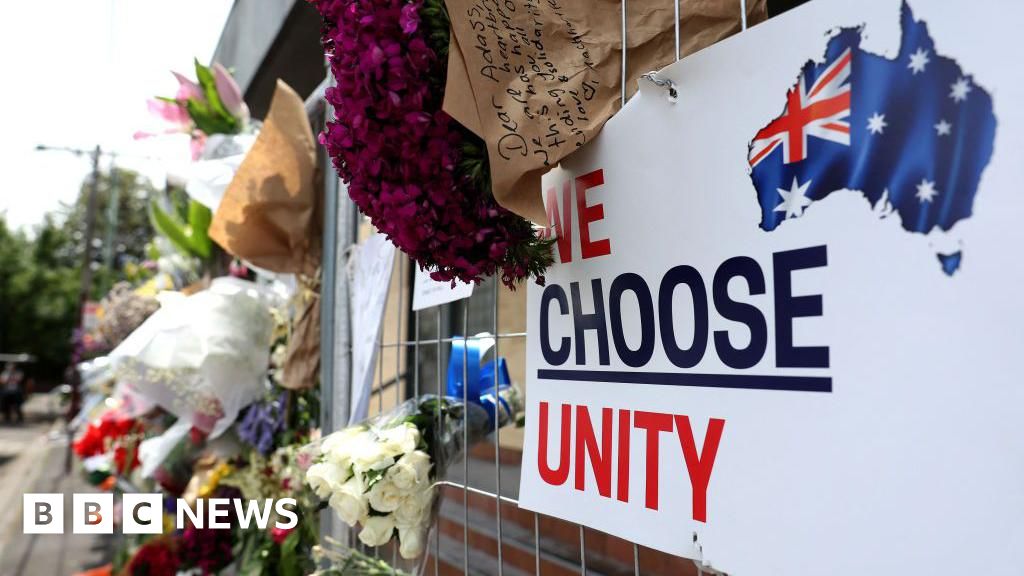ARTICLE AD BOX
Watch: Hear from one abortion patient in Florida, as state braces for new restrictions
By Holly Honderich
in Washington
Florida's six-week abortion ban has come into force, closing the door - for now - on the last abortion access point in the US South.
Anti-abortion campaigners have celebrated the new legislation - which replaces an existing 15-week law - as the gold standard of abortion policy and a major victory in the country's battle over abortion access.
But pro-choice campaigners say the ban will push an overstretched system to the brink.
They worry the new law in Florida, which had been the last state in the region without a near-total ban, will effectively cut off abortion access for more than 21 million women of reproductive age across nearly a dozen states.
"This essentially creates an abortion desert in the south-east part of our country," said Michelle Quesada, a spokeswoman for Planned Parenthood of South, East and North Florida. "This will be devastating."
But the change may be undone as soon as November, when Floridians will vote on a ballot measure known as Amendment 4, which could protect abortion access until around 24 weeks of pregnancy.
Both the new ban and the looming vote have set up perhaps the highest-stakes abortion fight since the US Supreme Court overturned Roe v Wade two years ago and rescinded the nationwide right to abortion.
After that landmark ruling in June 2022, most Republican-controlled states moved to restrict abortion outright or at six weeks gestation, a point at which many women do not yet know they are pregnant.
Image source, Getty Images
Image caption,Abortion opponents say the six-week ban will protect "unborn children"
Abortion there was legal until 15 weeks, making it a relative haven for women seeking the procedure in the region.
After Roe v Wade was overturned, Florida became "one of the main points of access for abortion care within the formal healthcare system in the south", said Isaac Maddow-Zimet, a data scientist at the pro-choice research group the Guttmacher Institute.
More than 84,000 abortions took place in Florida last year - a 12% jump from 2020.
More than half of that increase is attributed to out-of-state patients, Mr Maddow-Zimmet said, an estimated 9,000 people in 2023 alone.
Florida's new law restricts abortions after six weeks from the date of a woman's last menstrual period.
Patients must also appear for two in-person appointments spaced at least 24-hours apart - a requirement that providers say will be a challenge in an already restrictive time window.
The new law "makes it virtually impossible for people to be able to access care in time", said Daniela Martins, a spokeswoman for the Women's Emergency Network (WEM), an abortion fund in south Florida.
The law includes limited exceptions for victims of rape, incest, or human trafficking up until 15 weeks of pregnancy, with patients required to show documentation such as medical records or a police report. It also includes exceptions for fatal foetal abnormalities and for the life of the pregnant person.
Image source, Getty Images
Image caption,Those seeking abortions in the south may now have to drive hundreds of miles north
Abortion providers and campaigners say that many patients will fall through the cracks - that they will either be unable to travel hundreds of miles to an appointment or unable find one in already overcrowded clinics in Virginia, North Carolina and Illinois, which are now some of the nearest states where abortion is broadly available.
"There's nowhere that can absorb all of the patients that we see [in Florida], it's just not possible," said Amber Gavin, vice-president of advocacy at A Woman's Choice, an independent abortion clinic with a location in Jacksonville.
The new law has been welcomed by anti-abortion activists and leading state Republicans, who had lamented Florida becoming a hub for out-of-state patients.
"We don't want to be an abortion tourism destination," Republican Governor Ron DeSantis said last year. His office did not respond to the BBC's request for comment.
Mr DeSantis signed the six-week ban into law last April, but it was held up by legal challenges until last month, when a state supreme court ruling cleared the way for its enforcement.
Matt Staver, founder and chairman of the Florida-based anti-abortion group Liberty Counsel told the BBC that the state could now be "a sanctuary for life".
"This is a great day for protecting unborn children," he said.
Mr Staver emphasised that the six-week law also includes $30m (£24m) allocated each year to support pregnant women and new mothers, money that will go towards baby formula, car seats, adoption and parenting classes.
"Florida is putting its money where its mouth is and protecting mothers and their children," he said.
According to March of Dimes, a non-partisan maternal health non-profit, pregnant women in Florida "have a very high vulnerability" to poor outcomes, with nearly a quarter of all expectant mothers receiving "inadequate" prenatal care.
Image source, Getty Images
Image caption,Pro-choice supporters in Florida hope the ban can be un-done by a ballot initiative
But a second ruling from the Florida Supreme Court means the ban might be temporary.
On the same day as the court green-lit the six-week ban, it approved a ballot question that will ask voters whether to amend the state constitution to protect abortion until about 24 weeks of pregnancy.
Supporters of Amendment 4 have cited internal polls suggesting it has the backing of more than 60% of Florida's voters - the threshold required to for it to pass.
And all seven abortion ballot initiatives held in other states in the months since Roe was overturned have been successful, though most required a lower threshold and passed by just a simple majority.
Both anti-abortion and pro-choice activists have launched sweeping get-out-the-vote efforts, hoping to round up enough support before the November vote.
"The next several months are going to be very critical," said Liberty Counsel's Mr Staver. "Everything is on the line with this amendment, it's a fight for life."
Pro-choice campaigners have warned that, even if Amendment 4 is passed in November, there will still have been women forced to carry unwanted or unsafe pregnancies.
Michelle Quesada, of Planned Parenthood, said it is likely some of the state's clinics also will be forced to close, pushing physicians out of the state.
"It just means less access and less options for Floridians," she said. "This is devastating."

 8 months ago
21
8 months ago
21








 English (US) ·
English (US) ·